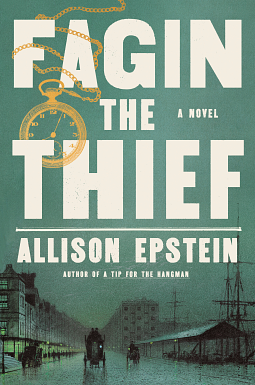Fagin the Thief, as you might expect, is a retelling of the Oliver Twist story from the perspective of its villain, Jacob Fagin.

I haven’t actually read Oliver Twist, though I’ve wanted to for many years. I suppose I’d heard enough of the story that it seemed like it might not be one of Dickens’ more nuanced works. On top of that, Dickens’ depiction of Fagin is considered one of the most antisemitic characterizations in literature (Dickens later removed his many negative references to Jews in this book). Epstein’s book addresses this problem, portraying Fagin as a complex character who is not wholly sympathetic but also not evil.
It’s hard to write about a retelling without having read the original book, so I’ll have to write about this novel on its own merits. Though I was curious throughout about the parallels to Dickens’ story, and the author explains much of this in her afterword.
Most of this novel occurs before the events in Oliver Twist. It begins in 1838, as Fagin is working with the Artful Dodger and meets Oliver, but then it goes back about 50 years to when Fagin is a young child, growing up with his mother, Leah, in a poor Jewish neighborhood. Fagin is clever and ambitious, too clever to be satisfied with the drudgery and antisemitism of daily life. He’s an outcast even in his neighborhood because his father was hanged as a thief. He first joins a gang of bullies, then he discovers his skill at picking pockets. He tries, for his mother’s sake, to stay on a straight path, but he’s drawn to a life of crime.
Fagin isn’t a good person, but he’s also not a bad one. He steals but he doesn’t hurt anyone, wishing mainly to be left alone. And when he sees a child who’s in danger of starving or being arrested, he takes them in and teaches them to survive on the streets of London.
Epstein incorporates many of the characters from Oliver Twist: Nancy, Bet, Bill Sikes, Bullseye, the Artful Dodger, Toby and Charley. Bill Sikes is a key character in the story, and Epstein spends much time exploring the friendship between the two men and contrasting their characters. Sikes is volatile, insecure, and violent, but also charming – while Fagin lacks charisma or good looks but takes care of the people around him.
Bill has never known how to love anything that can love him back. Care is weakness. Fear is failure. He and Nan will continue to give Bill their love and care and weakness, and Bill will bash his own fear against it until one or both of them breaks.
I loved the rich character development in this book. Bill Sikes is terrifying, and Fagin struggles with the world’s open hatred of him, and he is shaped by the antisemitism he encounters daily. There’s little reason for him to be a law-abiding citizen when he is despised just for the way he looks. Fagin frequently describes himself as selfish, but Epstein portrays him in such a way that Fagin’s perception of himself is mostly inaccurate.
This is a dark read, and a slow-moving one at times, but I felt deeply immersed in Fagin’s world. It’s the first book I’ve read by Epstein, but it won’t be the last. I definitely recommend this book for fans of Dickens, and now I look forward to reading Oliver Twist.
Note: I received an advanced review copy of this book from Netflix and publisher Doubleday Books. This book will be released February 25, 2025. It meets the Jewish Genre reading challenge.

